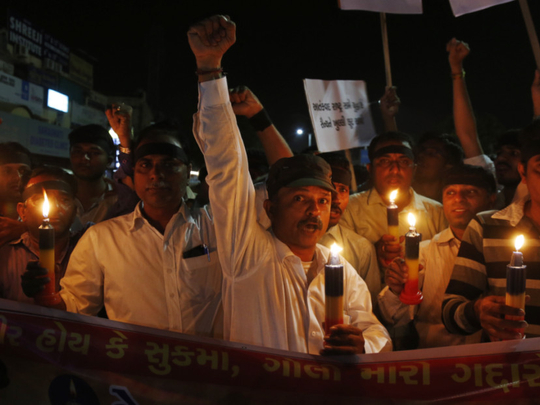
New Delhi: India’s paramilitary force fighting Naxalites in Chhattisgarh are up against not only the insurgents but inherent impediments — lack of potable water, high temperatures, fatigue and poor mobile networks.
Officials, who visited some of the interior camps of the Central Reserve Police Force in the Bastar region, where the CRPF lost 25 personnel in an ambush last Monday, have found that the quality of water is substandard resulting in many of them falling sick.
“We take various steps to purify the drinking water. But that is not enough as when the boys go on patrolling they some time have to drink water from open sources which leads to illness,” an officer said.
The temperatures in Bastar region during summers go up to 45 degrees Celsius and such hot and humid conditions make the security personnel tired soon, leading to frustration, he said.
To boost the morale of the paramilitary personnel, nutritious food, including non-vegetarian items, are being supplied to all camps.
Home Ministry officials say there is an urgent need to improve the condition of CRPF camps and the facilities offered to the personnel.
“Camps of the CRPF need to be upgraded,” said K Vijay Kumar, senior Security Adviser in the Home Ministry.
Poor mobile network also is a major hindrance for the CRPF men as they find it difficult to get in touch with their family members back home and this lowers their morale.
CRPF troops deployed for long stints in the Naxal hotbed of Sukma in Chhattisgarh are showing signs of fatigue, too.
The ministry officials, who visited Chhattisgarh after the massacre of 25 CRPF men, have found that majority of the 45,000 paramilitary personnel undertaking the high-risk anti-Naxalite operations in Bastar region have been posted there for more than three years.
“Fatigue has been noticed in jawans [troops] as many of them have been posted in Sukma for last five years even though normally they should be there for three years,” an official said, adding that there is decline in motivation due to their long deployment in the area.
A long duration of posting in Bastar is very stressful and the troops prefer to join counter-insurgency operations elsewhere including in Kashmir, even though they face militant attacks and stone-pelting mobs regularly there.
“Anti-Naxalite operations take a toll on security personnel as they face guerrilla warfare in hot and humid conditions and treacherous terrain,” an official said.
The CRPF is expected to effect an annual change over of its personnel soon so that they get relief after serving in hard areas such as Bastar by getting transferred to a less strenuous area.
According to latest statistics of the Home Ministry, the seven forces — the CRPF, the Border Security Force, the Indo-Tibetan Border Police, Sashastra Seema Bal, the Central Industrial Security Force, the National Security Guard and Assam Rifles — have lost 1,067 men in combat or counter-insurgency operations over a period of three years.
But more than thrice — as many as 3,611 personnel — have died due to illnesses.












